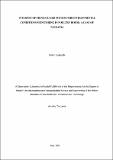Internet of things based system for environmental conditions monitoring in poultry house: A case of Tanzania
Abstract
Poultry health is imperative for the continued growth of poultry and increased production.
Environmental conditions such as temperature, humidity, and Ammonia gas impact the health
of the poultry; whereby, they can affect the respiratory system and eventually cause death. In
Tanzania, most farmers use charcoal and kerosene stoves to control these parameters as they
have limited access to economical, secure, and user-friendly poultry house monitoring
systems. However, such traditional methods are not environmentally friendly, unreliable,
difficult to manage, and inaccurate. In addition to that, many smart poultry monitoring
platforms proposed by previous studies are not centralized, thus making the system being not
scalable and costly. For example a farmer with three distributed coops needs three monitoring
platforms to monitor the coops while only single platform could suffice. Therefore, this study
proposes an Internet of Things (IoT) based system for environmental conditions monitoring
in the poultry house to address the aforementioned challenges. The survey was conducted in
Arusha and Kilimanjaro regions respectively to determine the strength and weakness of the
traditional methods used by poultry farmers, perception towards the proposed system and
identify the requirements needed to develop the proposed an IoT based system. The study
used Jupyter Notebook powered by Anaconda package manager and the Python language for
data analysis. Based on the requirements gathered from the survey, the prototype that is
divided into two four parts; sensing, aggregation, transmission and monitoring part was
developed, where the hardware components were selected based on the cost, open source,
availability in local market, Quality of Service (QoS), throughput and latency criteria. The
developed prototype was deployed in the field to verify and validate its performance. This
activity was done in seven days consecutively and the results indicated that the system would
save both small scale and large scale farmers in terms of time and labor costs as Farmer can
monitor and control the poultry house conditions securely, reliably, and remotely. The study
also proposes an algorithm to allow the system to work online, and offline (i.e., synchronizing
with the cloud server when the Internet access is available).

